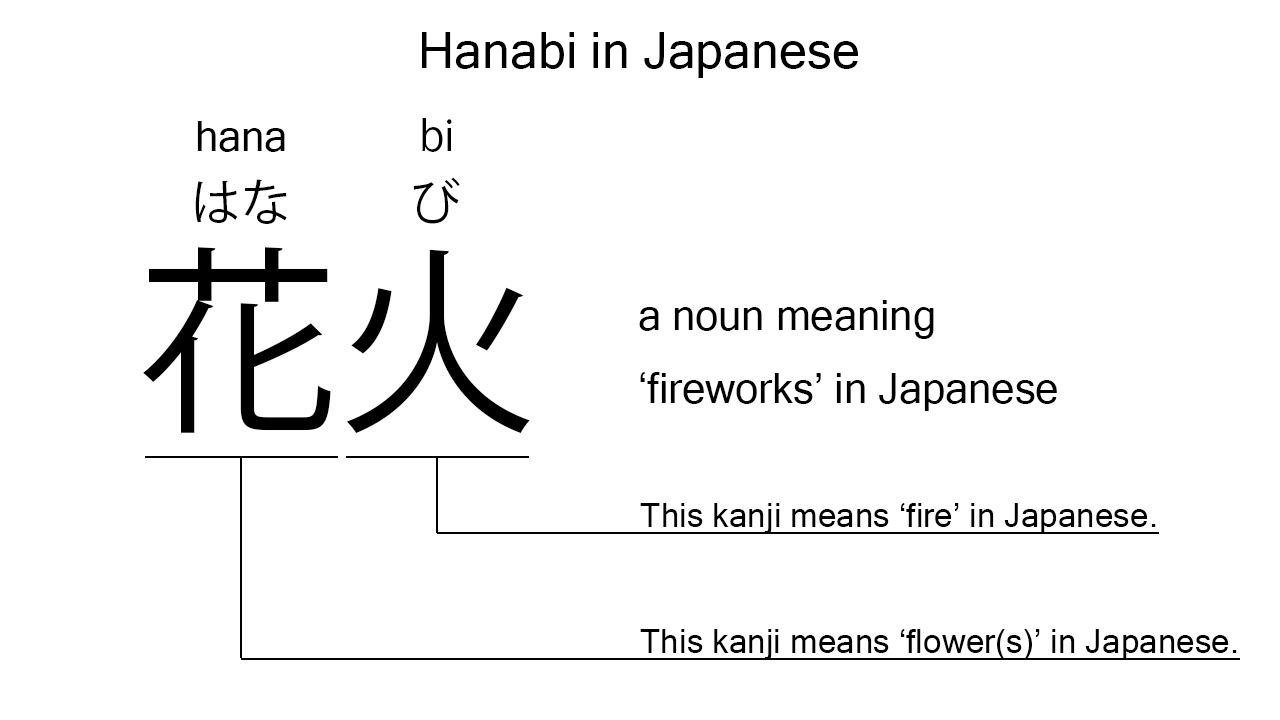What does “hanabi” mean in Japanese?
Native speakers use hanabi to mean ‘fireworks’ in Japanese. Perhaps, some Japanese learners know this word as it is sometimes used in Japanese movies, songs, novels, manga, anime, and the like. In this blog post, however, I will explain this word in detail based on its kanji expression. And also, I will explain how to use it through example sentences. My explanations would help Japanese learners understand hanabi more clearly. Then, let’s get started!
Contents
Definition and meaning of “hanabi”
Let me start with the definition and meaning of hanabi.
- hanabi – 花火 (はなび) : a noun meaning ‘fireworks’ in Japanese. This can also work as singular. Learn more about Japanese plural and singular.
Japanese native speakers use this noun to refer to ball-shaped objects that contain flammable powder and explode loudly in the sky with emitting colorful lights. They also use this noun to refer to the lights produced by the objects.
The definition and meaning are simple and clear. To understand this noun more clearly, however, let me explain its kanji characters in detail, one by one.
Hanabi in kanji
The kanji expression of hanabi consists of the following two kanji characters:
- 花 : a kanji character widely used to mean a ‘flower’ in Japanese.
- 火 : a kanji character widely used to mean a ‘fire’ in Japanese.
From these two kanji characters, we can understand that hanabi literally means a ‘flower fire’ in Japanese. This literal interpretation is not completely in line with the actual meaning, but still understandable, I think. Fireworks indeed look like flowers made of fire.

When we meet new kanji expressions, we should check their kanji characters in detail to understand their meanings clearly and deeply. In many cases, kanji characters tell us a lot about the meanings of the expressions they form. Actually, here, we could get the better understanding of hanabi through the detailed kanji check above.
So far, I’ve explained the definition and meaning of hanabi together with its kanji characters. Then, let me explain how to use it through the example sentences below.
How to say “fireworks” in Japanese
boku wa hanabi ga suki desu – 僕は花火が好きです (ぼくははなびがすきです)
I love fireworks.
Below are the new words used in the example sentence.
- boku – 僕 (ぼく) : a pronoun meaning ‘I’ in Japanese. This is used mainly by boys and young males.
- wa – は : a binding particle working as a case marker or topic marker. In the example, this works after boku to make the subject in the sentence.
- ga – が : a case particle used to make the subject word or the object word in a sentence. In the example, this is used after hanabi to make the object in the sentence.
- suki – 好き (すき) : the stem part of the na-adjective, sukina, which means ‘favorite’ in Japanese. Native speakers, however, often use this as an individual word to mean ‘to like’ or ‘to love’ in Japanese. In the example, this is used to mean ‘to love’ in Japanese.
- desu – です : an auxiliary verb used after a noun or adjective to make it polite. Probably, this is well known as a part of Japanese desu form. In the example, this is used after suki to make it sound polite.
This is a typical usage of hanabi. In this example, it works together with the case particle, ga, to become the object in the sentence.
Another example of “hanabi”
watashi wa kinou matsuri de hanabi wo mi ta – 私は昨日祭りで花火を見た (わたしはきのうまつりではなびをみた)
I saw fireworks at the festival yesterday.
Below are the new words used in the example sentence.
- watashi – 私 (わたし) : a pronoun meaning ‘I’ in Japanese.
- kinou – 昨日 (きのう) : a noun meaning ‘yesterday’ in Japanese. This can also work as an adverb almost anywhere in a sentence. In the example, this works as an adverb in the middle of the sentence to mean ‘yesterday’ in Japanese.
- matsuri – 祭り (まつり) : a noun meaning a ‘festival’ in Japanese. This can also work as plural.
- de – で : a case particle used to say where someone does something. In the example, this is used after matsuri to say where the speaker saw the fireworks.
- wo – を : a case particle used to make the object word in a sentence. In the example, this is used after hanabi to make the object in the sentence.
- mi – 見 (み) : one conjugation of the verb, miru, which means ‘to see’, ‘to watch’, ‘to look’, or such in Japanese. In the example, it has been conjugated for the better connection with its following word.
- ta – た : an auxiliary verb used after a verb, adjective, or auxiliary verb to make its past tense form. Probably, this is well known as a part of Japanese ta form. In the example, this is used after mi to make its past tense form, mi ta.
This is another example of hanabi. When we want to mean ‘fireworks’ in Japanese, this noun is always a very good option.
Summary
In this blog post, I’ve explained the definition and meaning of hanabi in detail based on its kanji expression. And also, I’ve explained how to use it through the example sentences. Let me summarize them as follows.
- hanabi – 花火 (はなび) : a noun meaning ‘fireworks’ in Japanese. This can also work as singular. These two kanji characters literally mean a ‘flower fire’ in Japanese. This literal interpretation is not completely in line with the actual meaning, but still understandable, I think. Fireworks indeed look like flowers made of fire.
Hope my explanations are understandable and helpful for Japanese learners.
Leave a Reply